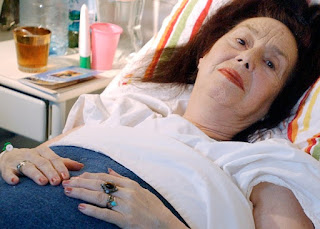Romanian woman, 66, gives birth to baby girl
A 66-year-old professor who writes children’s books claims to have become the world’s oldest woman to give birth, and doctors said Monday she and her day-old baby daughter were in good condition in intensive care.
Doctors at the Giulesti Maternity Hospital in Bucharest said Adriana Iliescu became pregnant through in vitro fertilization using sperm and egg from anonymous donors. They said she delivered her first child, Eliza Maria, by Caesarean section on Sunday and that a twin sister was stillborn.
The child is eating a bit of glucose,” Dr. Mirela Ranga, a hospital spokeswoman, said Monday. “Mrs. Iliescu is still in intensive care, but she is moving around. She is expected to go see her daughter a bit later.”
News of the birth at one of the capital’s leading gynecological clinics sparked debate in Romania over the ethics of women beyond the age of fertility having babies. One church official said it was shocking.
Mother 'more than happy'
Iliescu sat up in her hospital bed Monday and told Associated Press Television News she was “more than happy” to have given birth. Dr. Bogdan Marinescu, who runs the hospital, said the unmarried professor of literature from Bucharest had undergone nine years of fertility treatments.
AP video of Eliza Maria showed her squirming in an incubator. She was dressed in a pink and white bodysuit with a pale pink woolen hat. Doctors said she was breathing on her own.
The child was born more than six weeks short of a full 40-week pregnancy, the hospital said. She weighed just 3 pounds, 3 ounces, less than half the weight of an average newborn and was in the intensive care unit.
Doctors performed the Caesarean section after the smaller of Iliescu’s twins died in the womb, Ranga said. That child weighed just 1 pound, 8 ounces, she said.
Marinescu said Iliescu’s pregnancy was achieved on the first attempt, and that she initially was carrying triplets but lost the third fetus after nine to 10 weeks.
Marinescu has declined to comment on ethical questions regarding the pregnancy, but said he was impressed by Iliescu’s faith in God and her determination to have a child.
“She was in the right condition to carry a pregnancy,” he said.
'This was a selfish act'
Bishop Ciprian Campineanul, a member of the Orthodox Church’s bioethics committee, said clerics disagreed in principle with in vitro fertilization, in which eggs and sperms are fertilized in a lab dish and the resulting embryos are implanted in the womb, whatever the woman’s age.
“This case has shocked us all,” he said. “This was a selfish act.”
Daniel Muresan, a gynecologist and university professor in the northwestern city of Cluj, called Iliescu and her doctors brave but said he would not encourage similar births.
“It should remain an exception. It is at the limit of ethical guidelines because it is at the limit of nature. ... We all get old. Healthwise, it is risky for both the mother and the child who deserves to have parents to raise her,” Muresan said.
The Health Ministry said in a statement Monday it would offer its full support to Iliescu and the baby but would not encourage artificial insemination of women who are no longer fertile.
There is no law in Romania stipulating a maximum age for artificial insemination. A draft law awaiting approval in parliament bans fertility treatment for women who are above the normal reproductive age.




Comments
Post a Comment